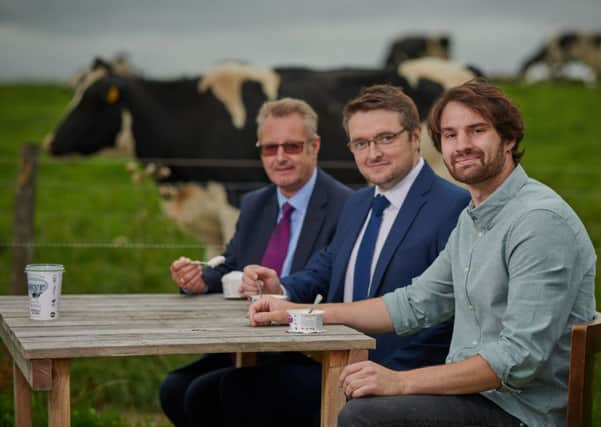Hesper Farm in Skipton looks to Icelandic inspiration with skyr yoghurt


Hesper Farm in Skipton launched its own Icelandic yoghurt called skyr in 2015. The business has now secured the backing of two Yorkshire investors.
Sam Moorhouse, the family farm’s third generation, was looking at ways of diversifying the business when he came across an article on Icelandic dairy farming and the concept of skyr.
Advertisement
Hide AdAdvertisement
Hide Ad“The liquid dairy market tends to fluctuate quite a bit,” he told The Yorkshire Post. “We can go through good times and bad times.”
Swotting up on skyr he realised that it was high in protein and calcium but low in fat.
“It’s nutritional profile was on-trend,” Mr Moorhouse said, “but also it’s an interesting thing.”
To learn more, Mr Moorhouse flew across to Iceland and enlisted the help of Thorinn Sveinsson, who had previously managed one of the biggest skyr producing dairies in Iceland.
Advertisement
Hide AdAdvertisement
Hide AdMr Moorhouse said: “He agreed to show me how to make it and helped me launch this business in the UK.”
He added that the unique selling point of Hesper Farm’s skyr is that it’s made using authentic techniques with British milk on a family-run dairy farm.
Since the launch, the family has invested over £200,000 in new machinery and equipment. It has seen relative success having started off in farm shops it now counts itself as a supplier to Morrisons.
However, in order to step up a level, it has secured investment from two Yorkshire entrepreneurs.
Advertisement
Hide AdAdvertisement
Hide AdWim Batist, lead investor and founder and chairman of Elland-based BCA Group, said: “While Sam had financial help from his parents to set up, he needed a lot more to reach where he wants to be.
“His business has potential to become a multi-million pound operation, especially with his strict quality control.”
The additional investment is set to create an additional six new jobs over the next 12 to 24 months.
The business will also make about 55,000kg of skyr this year compared with around 9,000kg in its first 12 months.
Advertisement
Hide AdAdvertisement
Hide AdCurrently the yoghurt is produced by three people but is already being supplied to 110 Northern stores.
Mr Moorhouse said: “We are now at the stage where we have grown year-on-year, near enough doubling every year. We’ve invested as much as we can personally but we’ve got to a point now where we want to take the next step.”
That next step is national expansion. The business is looking at securing contracts with big retail chains.
“We’ve got a really clear plan, very clear objectives of what we want to achieve in the next couple of years with the brand,” Mr Moorhouse said.
Advertisement
Hide AdAdvertisement
Hide AdThe investment deal was brokered the corporate finance team at York-based accountancy firm Garbutt & Elliott.
Mr Moorhouse says Garbutt & Elliott was initially brought in around two years ago to “sort out” the firm’s accounting.
“Since they’ve come in it’s improved a lot,” Mr Morrhouse said. “That gives us that platform to grow.”
At the moment the focus is very much on skyr but Mr Moorhouse already sees potential in the by-product of the production of this Icelandic yoghurt.
Advertisement
Hide AdAdvertisement
Hide Ad“It’s a bit early to be saying at the moment but we are doing research into other products we can make with the by-products,” he said.
The firm already sells the whey by-product and because skimmed milk is used in skyr there’s also potential uses for the cream leftover.
Trip to Iceland and whey he goes
Skyr yoghurt is made in a 24-hour labour-intensive process, with minimal mechanisation, by incubating skimmed milk with live active cultures and straining away the whey. Each pot uses four times as much milk as traditional plain yogurt, making it thick and creamy. The only sweetness is natural.
Sam Moorhouse started investigating the potential of sky back in 2014.
Advertisement
Hide AdAdvertisement
Hide AdHe said: “I hadn’t tried it until I got into Iceland. It’s their main dairy product over there. I tried it and it was a good tasting yoghurt.
“I went back to Iceland and learnt how to make skyr in the Westfjords in a factory over there.”